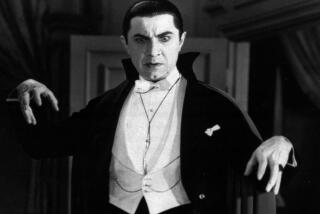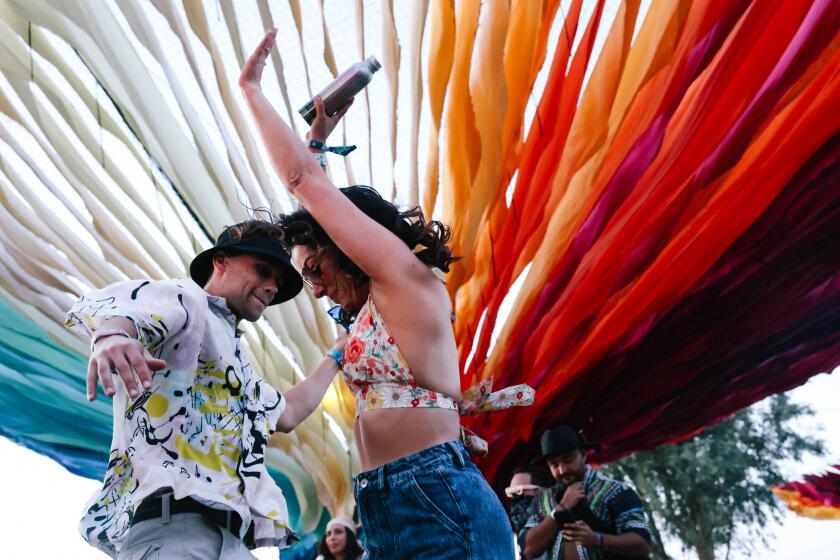Unhinged America
- Share via
AMERICA as a source of European literary fascination dates back at least as far as Alexis de Tocqueville, who spent nine months traversing the country in 1831, interviewing everyone from presidents to prisoners on his way to compiling “Democracy in America.”
Louis Theroux’s aims in “The Call of the Weird” are a bit more humble. The book documents his ramblings through a variety of fringe American subcultures, each more dismal than the last. No sooner has he finished with the UFO cultists than it’s on to the white supremacists, gansta rappers and porn stars. De Tocqueville this ain’t.
Theroux, son of the famous novelist and travel writer Paul Theroux, is a well-known television personality in England, where he hosts BBC documentaries about -- well, mostly about fringe American subcultures. This book, his first, amounts to a literary spinoff, albeit one with cinematic inclinations. Theroux provides lovely shots of the desolate Western landscape, for instance. “The high desert softened into prairie,” he writes. “Flat and empty, the land stretched on for miles to the pale brown hills in the distance.... Farm towns appeared, with John Deere dealerships and feed stores. After the clamorous hoardings and hotels of gambling country, these towns seemed spooky and aloof.”
He also has a knack for locating the comic moment within the absurd, as when a gaggle of male porn stars, having just degraded a female colleague, launches into an earnest discussion of politics. “ ‘Two to four Supreme Court appointments are open,’ someone said, mentioning the name of Chief Justice Rehnquist. ‘Unemployment is out of control,’ someone else said. Then, referring to Republican voters, a third said: ‘You get away from the coasts and this is just a very backward country. It’s scary.’ ”
You’ll get no argument from Theroux. He spends months tracking the most unhinged of our populace, from Thor Templar (Lord Commander of the Earth Protectorate) to Lamb and Lynx Gaede, the twin girls who make up a white-power folk duo called Prussian Blue. His accounts read, at times, like the log of a bounty hunter dispatched by the National Institute of Mental Health.
Theroux displays an unflagging sympathy for the fanatics he meets, a function of his soft heart, or perhaps his good manners. Happily, his time with them yields a number of genuine insights. “Everyone wanted his own outfit,” he notes, after visiting the vestiges of a survivalist stronghold in Idaho. “Everyone was looking for community, but on his own strict terms. A cooperative of rabid individualists, it was oxymoronic in its very conception, like a social club for hermits.” He even evinces a certain bemused admiration for some of his subjects, who live unconstrained by the standards of veracity that dog most of us. “On the list of qualities necessary to humans trying to make our way through life, truth scores fairly low,” he observes in his epilogue. “Why do people believe and do weird things? Because in the end, feeling alive is more important than telling the truth.”
Agreed. The problem is that his subjects aren’t just weirdos. They are deeply troubled people, dizzy with self-deception and often choked by hate. And Theroux is drawn to them precisely because of their pathologies. The result is that his reportage comes to feel more like rubbernecking after a while. Of one particularly bleak racist march, he writes: “It was like a street theater version of ‘The Jerry Springer Show,’ with the same intrusive, kitchen-sink atmosphere of being granted access to something private, unseemly, and almost trivial.” I couldn’t help applying the same description to his book at times. In Theroux’s defense, he does seem to recognize his own capacity for exploitation. “A little like a cult leader or a prostitute,” he confesses at the close, “I had been working in a gray area somewhere south of absolute candor.”
The most effective moments of the book are those in which the author joins the ranks of the abject. Waiting to rendezvous with an elusive hooker, he offers this startling self-portrait: “I had my notebook on the table and a glass of red wine in a little plastic cup. It looked a little depressing. Lonely journalist on the road. Sad empty little life. I felt unmasked.”
Unfortunately, the folks in this curious travelogue are mostly attempting to bully or con Theroux. That may spur some giggles in Britain -- those wacky Yanks! -- but it’s hardly breaking news in America circa 2007, which is full of damaged souls pouring their hearts out for the TV cameras. The quality too often absent from “The Call of the Weird” is the very one we value in De Tocqueville: perspective. Theroux would have done well to step back from the bizarre particulars and consider the psychological and economic factors that pushed his subjects toward their extremism. People are not born weird. They seek refuge in their beliefs.
And what, exactly, constitutes “weird” in Bush’s America? How different is a brigade of UFO worshippers, after all, from the presidential aide who mocks those who choose to live in a “reality-based” world? Or the millions of evangelicals who believe they will be transported up to the heavens in the coming rapture? And what of those white supremacists? Do they bear any relation to the patriots who express an ever more casual and public bigotry toward foreign nationals and immigrants? In seeking out the most paranoid and aggrieved of our citizens, Theroux should have put the values of what is often termed “mainstream America” to the test. Instead, he gives us a pass.
He’s not the first European to do so, mind you. De Tocqueville himself predicted that Americans would unite to build a nation that exceeded its citizens’ selfish desires. Then again, he never kept the sort of company Theroux does. *
More to Read
Sign up for our Book Club newsletter
Get the latest news, events and more from the Los Angeles Times Book Club, and help us get L.A. reading and talking.
You may occasionally receive promotional content from the Los Angeles Times.









